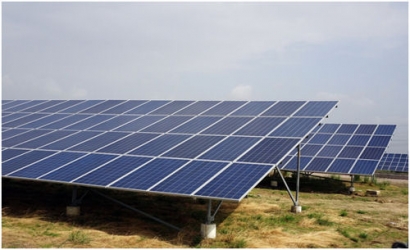
Permission is expected to be granted for the Mynydd y Gwrhyd Solar Farm next month, cementing Neath Port Talbot’s reputation as one of the most innovative boroughs in the country. The solar farm, which is adjacent to two existing community wind turbines owned by Awel Coop will, together with the wind farm, supply the area with apotential yield of 3MW which could power up to 3000 homes.
This state-of-the-art facility will be community owned, with people across the UK offered the option to buy shares in the scheme, with preference given to local people.
The Mynydd y Gwrhyd solar scheme is being driven by Dan McCallum, a force for community-based change within the energy sector. Awarded an MBE for services to community energy in Wales in 2018, McCallum has advised over 50 energy groups in the UK. He is also the co-founder of Awel Aman Tawe, a localized energy charity, and he worked with DECC to help develop the UK’s very first Community Energy Strategy. He is currently working on Egni Coop’s rollout of rooftop solar across Wales – this has now installed over 3MW including such sites as the Geraint Thomas National Velodrome of Wales.
McCallum says that, “Wth Mynydd y Gwhyd solar farm, we want to bring everybody in and make them a part of this incredible success story for the area. We’ve included an education area in the design plans, because it’s important that people of all ages feel the benefit. Essentially, our vision is that the Gwrhyd Mountain where our wind and solar farms are located becomes the beating heart that powers the community and provides economic, educational and wellbeing benefits too. This isn’t energy that is sold to the people, but energy owned by the people, which makes it a force for so much good in the local area.”
Awel Aman Tawe engaged renewable technology specialists Dulas, based in Machynlleth, to design the scheme and to prepare and manage the resulting planning submission. By working with a Welsh company, Egni furthered their ambition to support local business, ensuring that as much revenue and as many skills and benefits are kept in the country as possible.
Senior Project Manager Rachel Kennedy has overseen the project, ensuring that the scheme is the biggest and most profitable possible within capacity constraints. She states that, “We’ve been really sensitive to the local area, ensuring that the plans reduce impacts on, and provide better access tocommon land and that all stakeholder perspectives have been considered. That meticulous process has workedreally well – we are hearing so much eagerness from the local community for the development. That’s great because the legacy of getting this in place will last generations.”
Michael Phillips of Dulas writes that,“It’s brilliant timing for local authorities and charitable bodies to drive these initiatives. Energy companies, such as Bulb and Octopus, are lapping up community energy at a local and distribution level, because such energy purchasing obviouslyreflects well on their operational impacts. And in this way, these community schemes become excellent long-term financial investments for all concerned.”
A planning decision is expected from NPT Council in September 2020.

